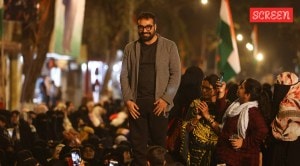15 Iraqis die in Qaeda suicide attacks
Twin suicide car bombs killed at least 15 people during the morning rush hour in Central Baghdad on Thursday, cutting short what had appeare...

Twin suicide car bombs killed at least 15 people during the morning rush hour in Central Baghdad on Thursday, cutting short what had appeared to be a lull in violence since elections in January.
Two other bombs were found in the area and were detonated by controlled explosions that caused no casualties, said US Captain Jeff Dirske. Reporters at the scene had earlier said that a third bomb killed one person.
The blasts came a day after a series of explosions around the country that killed 15 people. Together they constitute one of the deadliest spates of guerrilla activity in six weeks. The attacks would appear to mark a new surge in the violence that has been so common over the past two years in Iraq but which seemed to have subsided since the elections.
The suicide bombs detonated in quick succession near an Interior Ministry building on a crowded street, destroying 15 cars and scattering debris over a wide area, witnesses said.
Al Qaeda in Iraq, a group led by Jordanian militant Abu Musab al-Zarqawi, claimed responsibility for two of the blasts in a statement posted on the Internet. ‘‘Two lions from the martyrs’ brigade … launched themselves — one attacked an apostate police patrol guarding the office of the apostate minister while the second hit the rear end of a nine-car patrol,’’ the statement said.
Followers of Zarqawi, the most wanted man in Iraq, have claimed responsibility for the most spectacular attacks in the country.
An Interior Ministry official said at least 15 people, including children, were killed and the death toll could rise. Officials at nearby hospitals reported more than 30 wounded.
Meanwhile, a Texas businessman and two of his companies were charged with paying secret kickbacks to Iraq in a federal indictment unsealed on Thursday as part of an investigation into the scandal-plagued UN oil-for-food programme.
David Chalmers Jr., his oil company Bayoil of Texas, and Bayoil Supply & Trading Ltd., based in the Bahamas, faced federal criminal charges as part of the scheme to pay millions of dollars in secret kickbacks to Iraq.
Two others also were charged in the plot: Ludmil Dionissiev, a Bulgarian citizen living in Houston, and John Irving, a British citizen, according to the indictment unsealed in US District Court in Manhattan.
The indictment charges that the kickbacks were paid so the Bayoil companies could participate in selling Iraqi oil under the United Nations’ programme. The $67 billion oil-for-food programme allowed the Iraqi government under Saddam Hussein to sell oil to finance purchases of civilian goods for its people living under UN sanctions.
The programme began in December 1996 and ended after the US-led invasion in 2003. Iraq has released papers documenting bribes, kickbacks and oil smuggling.
From mid-2000 to March 2003, Iraq required recipients of allocations of oil to pay a secret surcharge to front companies and bank accounts controlled by the Iraqi regime. The requirement violated UN sanctions and US criminal law. — Reuters
Photos





- 01
- 02
- 03
- 04
- 05


























